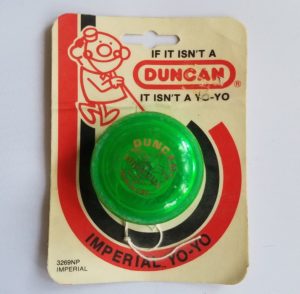
Many a kid was seen walking down the street playing with a yo-yo when we were kids. They were also played with by our parents, and probably our grandparents, too.
The yo-yo is a toy that has had many waves of popularity since its introduction early in the 20th century. One of those waves coincided with my childhood, another one hit in the early 70’s, when I was in junior high. During the latter craze, yo-yos and clackers were banned at schools all over the country, as kids played with the toys instead of doing their lessons. At Bentonville Middle School, the principal kept a box in his office that was full of confiscated yo-yos, popperknockers, and squirt guns.
The yo-yo can be traced back to Greece about 500 B.C. It is belived to have been used in China long before that date, but actual specimens from Greece have been unearthed. Artwork from the period also shows people playing with them.
The yo-yo spread around the world. Art from places as diverse as India and France from the 18th century depicts them. They also achieved a large degree of popularity in the Philippines.
In 1915, Filipino Pedro Flores immigrated to the United States. He went to law school, but never completed his law degree and began instead making yo-yos while working as a bellboy. In 1928, Flores started his Yo-Yo Manufacturing Company in Santa Barbara, California. Two years later, the Donald Duncan Company bought him out, and, despite the Depression, the yo-yo business did pretty well.
Duncan survived the Depression and sold millions of yo-yos over the next thirty years. They hit a wave of popularity during WWII, then faded again. In the early 60’s, they took off again. Interesting how the yo-yo business went up and down, isn’t it?
But Duncan received a lethal blow in the midst of their toy’s popularity. When they bought Flores’ “invention,” they also trademarked the name “yo-yo.” That meant that competitors sold “come-backs”, “returns”, “returning tops”, “whirl-a-gigs”, and “twirlers.” However, in 1965, the Federal Court of Appeals ruled that Duncan’s trademark for the word “yo-yo” was no good. Yo-yo’s name had become so widespread that it was now a permanent part of the language and it no longer only described the toy, it was the toy. The legal costs incurred sank Duncan.
The company which had been manufacturing Duncan’s plastic yo-yos bought the Duncan name and took off like a rocket. Yo-yo innovations began pouring forth, and another wave of popularity hit the early 70’s.
As the years went by, things like ball bearing shafts, clutch springs, and rim weighting have turned the humble yo-yo into a sophisticated performance piece. But we Boomers have fond memories of cheap wooden models, or Duncan Imperials that were a bit more pricey, as we made our way from childhood to being grown-ups.